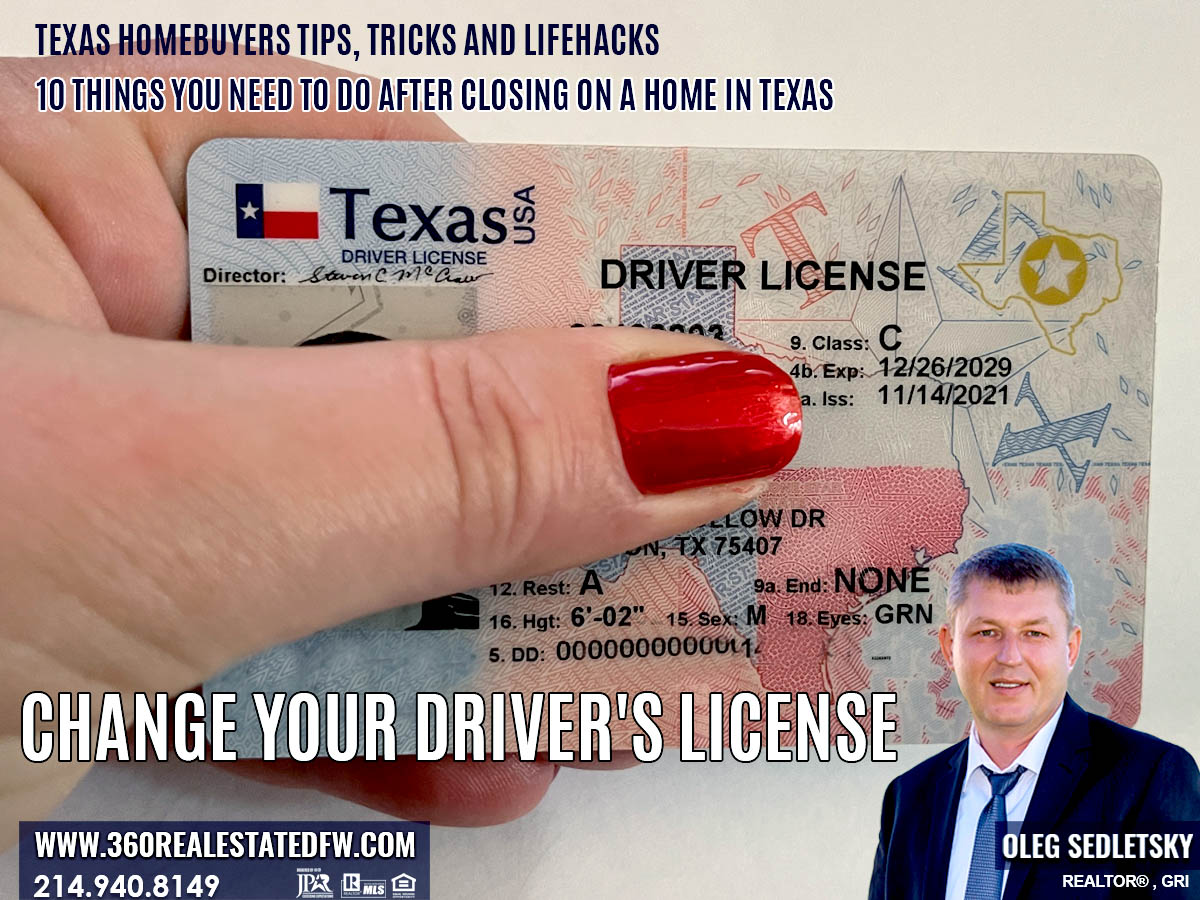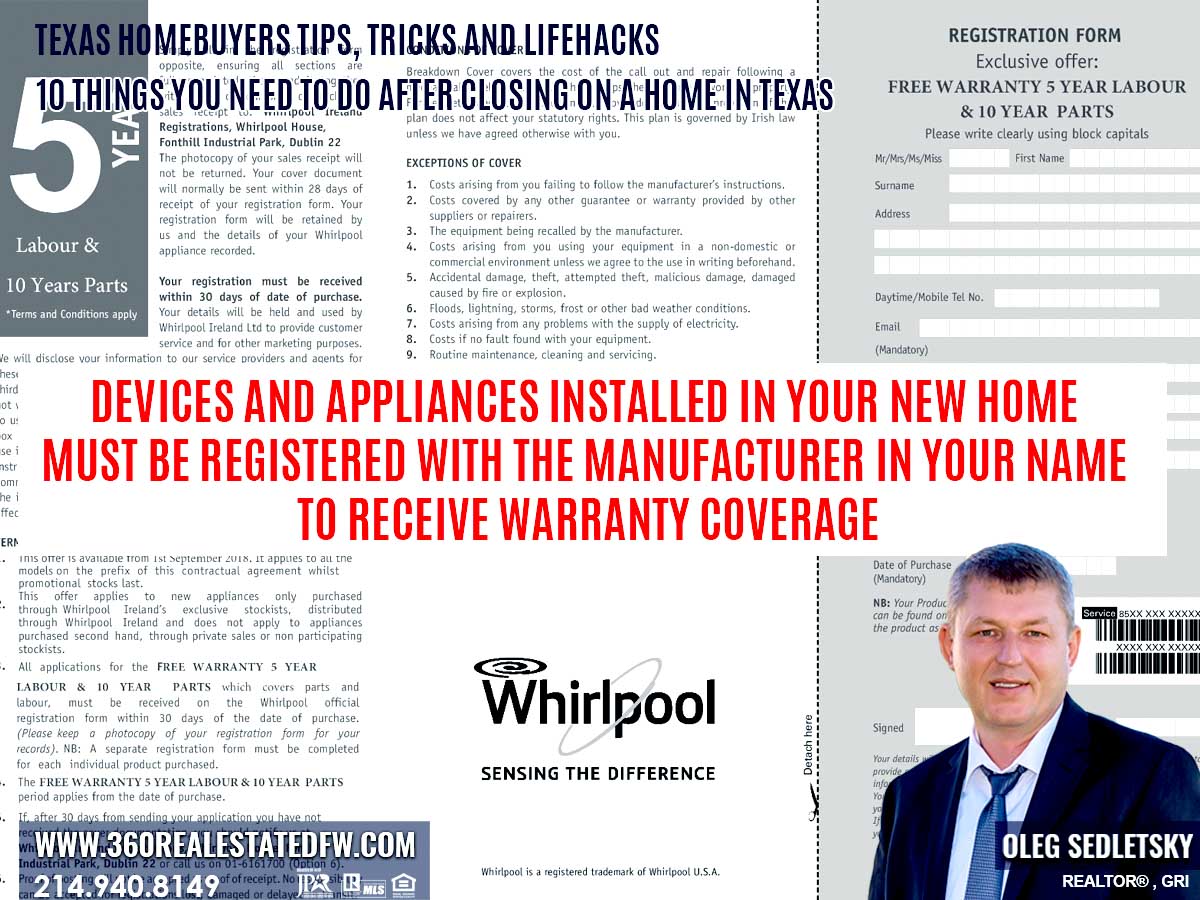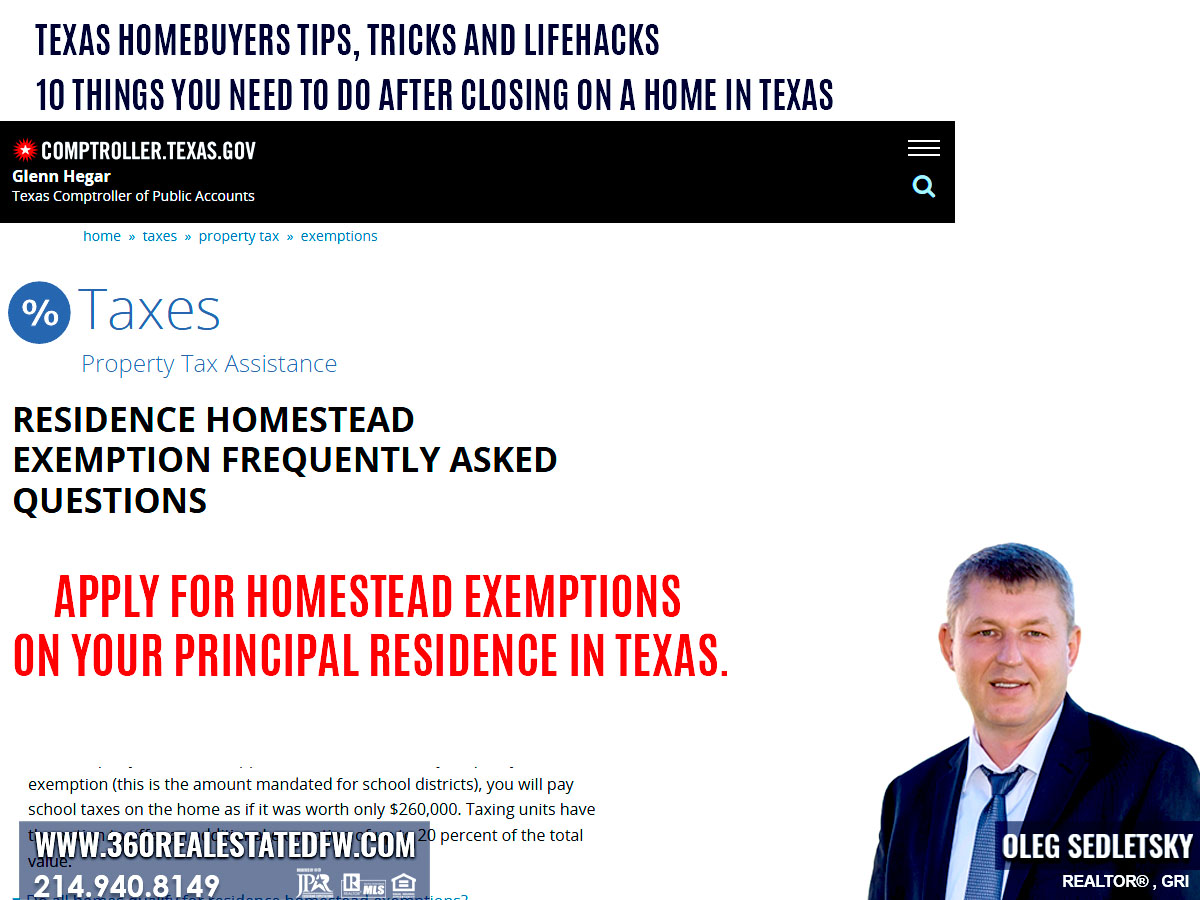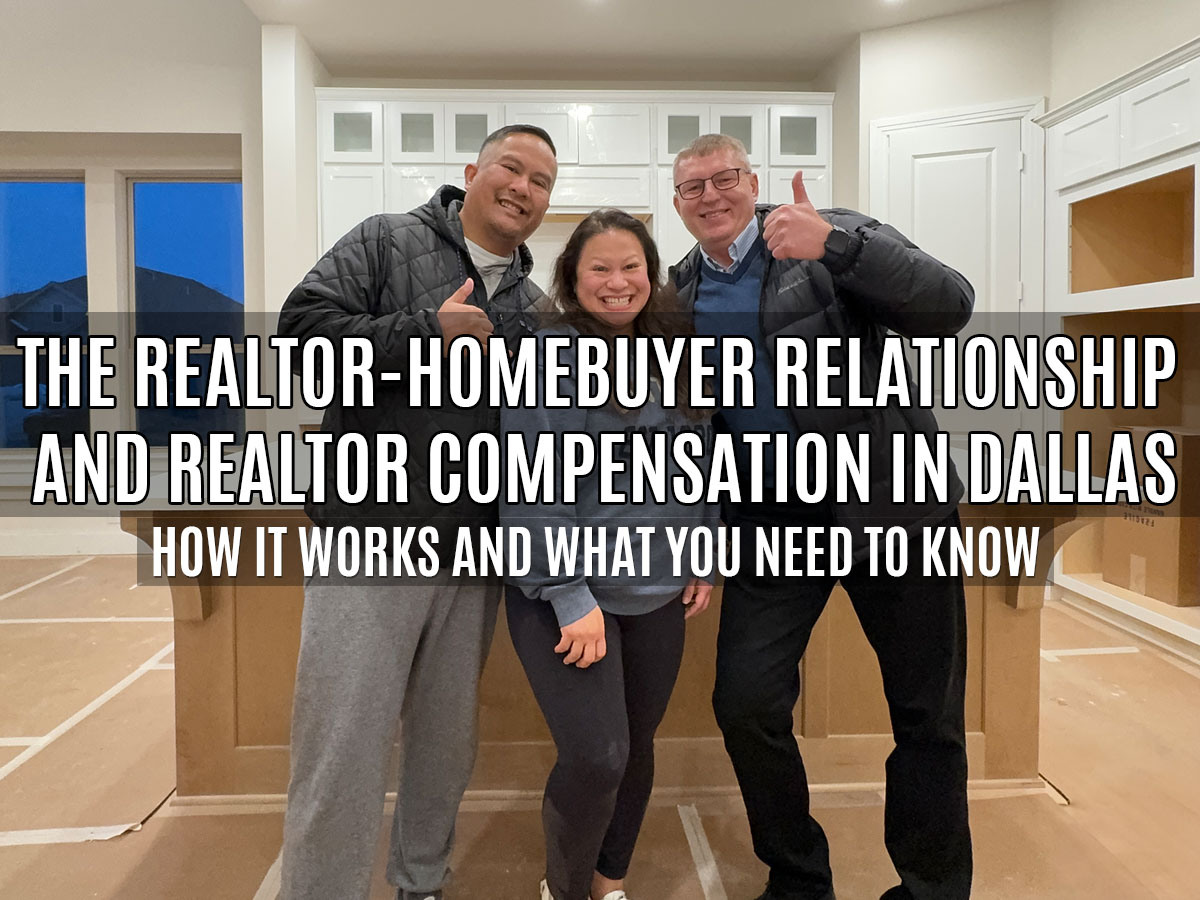10 Things You Need to Do After Closing on a Home in Texas
You’ve done it! You have closed on your new house in Texas and are officially homeowners. Now comes the fun part – setting up your home and making it yours! Before you get too excited, though, there are a few things that you should take care of right away after closing on a home. Read on to learn about the 10 things you need to do as soon as possible after closing on your new house.
Before we dive in, you might be wondering what makes me qualified to share this information with you?
Well, as a dedicated Realtor who assists clients in relocating to Texas, I’ve accumulated a wealth of insights from countless of my out-of-state clients. Their experiences reveal common patterns, and I’m excited to share these valuable tips with you. Trust me, with this information, you’ll feel at home in Texas in no time!

1. Change Your Address with the Post Office
The first thing you should do is change your address with the post office so all of your mail will go to your new home instead of your old address. This can easily be done online or in person at your local post office.

2. Notify Applicable Entities About Your Relocation
Once you have changed your address with the post office, make sure to notify any applicable entities, such as employers, banks, insurance companies, doctors’ offices, etc., of your relocation so they can update their records accordingly.
3. Transfer Subscriptions or Memberships
If you have any subscriptions or memberships that need to be transferred to your new address when moving into a new house (like magazine subscriptions or gym memberships), now is the time to do it!
4. Transfer Utilities Into Your Name
It’s also important to transfer all utilities like gas and electricity into your name so that they are being billed correctly and everything is up-to-date with the utility company before you move in.
Unlock Exceptional Service!
Assistance with all your real estate needs in the Dallas-Fort Worth area is just a click or call away. Reach out at 214-940-8149 or connect through the links below.
5. Follow Your New Town’s and Subdivision Public and Social Media Accounts
It’s always helpful to follow any public accounts associated with the town in which you live, such as the police department or city council on social media platforms for updates about what’s going on in town and other helpful information for residents. If there are any social media accounts associated with the subdivision in which you live, make sure to follow them too! This will help keep you updated about what’s happening within the community and provide helpful information about where you live (such as garbage pick-up dates).

6. Change Your Driver’s License
Don’t forget – if you moved from another state (or even just another county!), make sure that you change your driver’s license information, so it reflects where you currently live and has an updated photo of yourself! This is important if you plan to apply for homestead exemption in any Texas County, as it requires submitting a driver’s license that has been updated with the correct Texas address. Taking the time to update your driver’s license will ensure that you have access to all of the benefits and exemptions available for homeowners.

7. Register your appliances with the manufacturer in your name to receive a warranty coverage
If you purchase a new construction home in the Dallas area, it will come with a builder’s warranty that will cover the structural and cosmetic aspects of your home. It is one of the benefits of buying a new construction home!
But, it is important to remember that devices and appliances installed in your new home must be registered with the manufacturer in your name to receive warranty coverage.
Appliances such as stoves, dishwashers, washers/dryers, HVAC units, refrigerators, water heaters, and garage door openers should all have their warranties registered by the 30-day mark after you close on the property.
Suppose you need to replace any malfunctioning devices or appliances within 30 days of closing on the home. In that case, you will have to contact the builder directly for assistance.
After 30 days have passed, however, the manufacturer’s warranty will then be responsible for repairs or replacements.
That’s why it’s essential that you make sure these items are registered, so they are covered!

8. Apply for homestead exemptions on your principal residence in Texas.
Applying for homestead exemptions in Texas can be a beneficial way to reduce your tax burden.
These exemptions are applied on the assessed value of your home, and in most school districts, the maximum is set at $40,000.
Taxing units may also offer an additional exemption of up to 20 percent of the total value, further reducing the amount of taxes that you are responsible for.
By taking advantage of these exemptions, you can save significant amounts on taxes every year.

9 . Use Pest Control Service Before moving in
It is a good idea to use a professional pest control service. This is a great way to limit your chance of having an unwelcome guest while residing in your new place. Fortunately, there are plenty of options from which you can choose. Simply search “pest control near me” or ask your realtor for recommendations. Investing in pest control services will help ensure that all household members are comfortable and enjoy life without unwanted visitors.
10 . Make Preparations For Moving Into Your New Home
Finally, don’t forget that moving into a new home requires preparation, such as packing boxes and gathering supplies—so start getting ready sooner rather than later so everything goes smoothly when moving day arrives!
Congratulations once again – now that all of these checks have been completed, you are officially settled into your new home! These ten tips hopefully get a good start toward making the most out of being a homeowner! Enjoy!
Are you ready to experience the joy of homeownership in the vibrant Dallas-Fort Worth area?
Whether you’re in search of an existing home or a brand-new construction, rest assured that I’m here to assist you every step of the way.
With a dedicated Realtor by your side, the home-buying process becomes a breeze. Say goodbye to stress, and let me handle all the intricate details on your behalf.
Getting the guidance you need is as simple as filling out a brief questionnaire on my Homebuyers contact form. From there, I’ll take care of everything, ensuring a seamless and hassle-free journey towards finding your dream home.
Call/Text 214.940.8149

The Buyer’s Agent Duty
READ: Texas Real Estate Commission Information About Brokerage Services
AS AGENT FOR BUYER/TENANT: The broker becomes the buyer/tenant’s agent by agreeing to represent the buyer, usually through a
written representation agreement. A buyer’s agent must perform the broker’s minimum duties above and must inform the buyer of any
material information about the property or transaction known by the agent, including information disclosed to the agent by the seller or
seller’s agent.
A BROKER’S MINIMUM DUTIES REQUIRED BY LAW (A client is the person or party that the broker represents):
– Put the interests of the client above all others, including the broker’s own interests;
– Inform the client of any material information about the property or transaction received by the broker;
– Answer the client’s questions and present any offer to or counter–offer from the client; and
– Treat all parties to a real estate transaction honestly and fairly.
TO AVOID DISPUTES, ALL AGREEMENTS BETWEEN YOU AND A BROKER SHOULD BE IN WRITING AND CLEARLY ESTABLISH:
– The broker’s duties and responsibilities to you, and your obligations under the representation agreement.
– Who will pay the broker for services provided to you, when payment will be made and how the payment will be calculated.
TYPES OF REAL ESTATE LICENSE HOLDERS:
– A BROKER is responsible for all brokerage activities, including acts performed by sales agents sponsored by the broker.
– A SALES AGENT must be sponsored by a broker and works with clients on behalf of the broker.
Latest from Dallas Real Estate Blog
– Texas Homebuyers Tips, Tricks and Lifehacks
– New Construction Homes in Dallas TX
– Mortgages for Homebuyers and Investors in Dallas-Fort Worth











